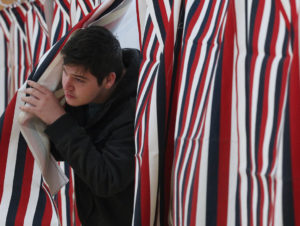Granite State proud of its prime place in poll position
by Alena Masterson and Kusum Aryal
The 2020 race for the White House will mark the 100th anniversary of New Hampshire’s first-in-the-nation presidential primary. But the honor didn’t come easy.
“Being first in the nation was never planned,” said New Hampshire Secretary of State Bill Gardner. “It was created to give more people an opportunity to participate.”
Prior to 1831, presidential candidates were selected in informal meetings of congressmen from each party. These were known as king caucuses because a small group of elites were acting as “kingmakers,” said Christina Cliff, a political science professor at Franklin Pierce University.
But advisers to President Andrew Jackson were pushing for changes in how presidential and vice presidential

(Nashua, NH – 2/9/16) A man exits a voting booth at Broad Street Elementary School, Tuesday, February 09, 2016. Staff photo by Angela Rowlings.
candidates were selected. They turned to the Granite State legislature, which issued the initial calls for the first major party national convention.
“It was then only fitting,” Gardner said from his statehouse office in Concord, “that someone from New Hampshire called the convention to order, called the roll of the states and gave the opening address.”
In that 1832 address in Baltimore, Frederick A. Sumner explained that New Hampshire simply wanted to have more people be part of selecting the party nominees for president and vice president.
New Hampshire, Gardner said, has had a leadership role in presidential politics ever since.
“We were a barometer for the country,” Gardner said.
The first New Hampshire primary was held in 1916, on the same day as Minnesota and a week behind Indiana, which was the first that year.
But within four years, Indiana had moved its primary further out and Minnesota’s was eliminated. The New Hampshire primary was now the first in the nation, a position it has held firm since.
And since 1952, New Hampshire voters have been able to cast a ballot for a specific presidential candidate rather than delegates.
“We don’t have the Super Bowl or a professional team,” Gardner said, “but we do have a political culture that makes people want more of a say.”

Socialize